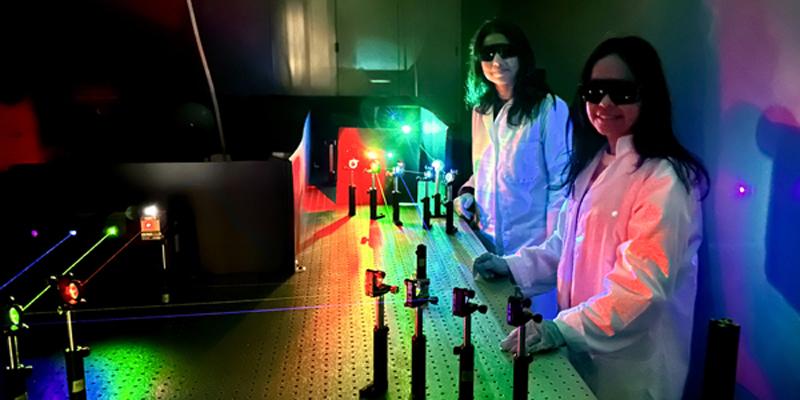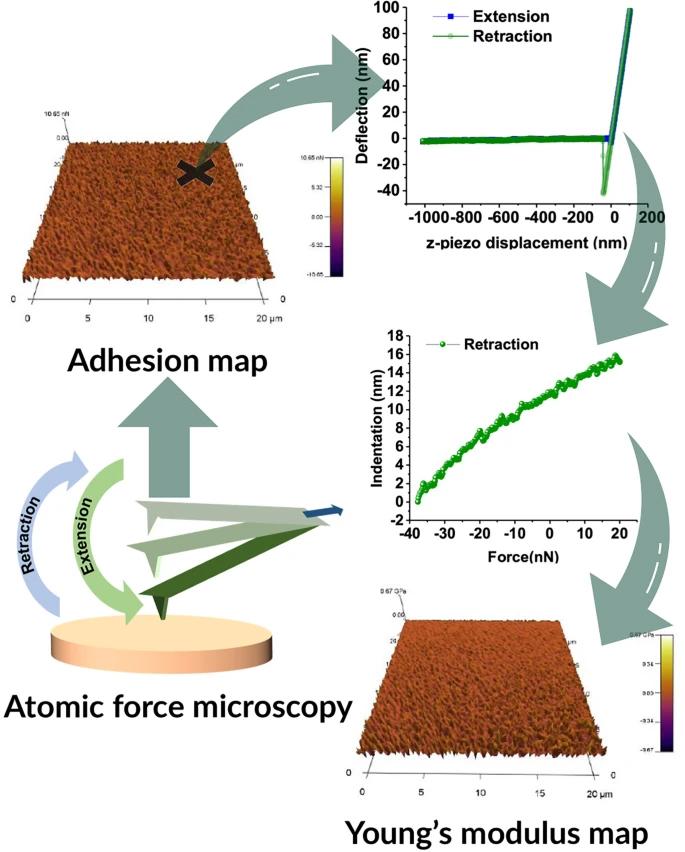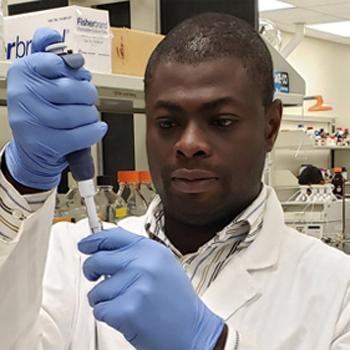
Candidates for a Ph.D. degree in Chemistry plan, execute, evaluate, and communicate original chemical research.
The graduate program spans all five traditional disciplines of chemistry (Analytical, Biochemistry, Inorganic, Organic and Physical). Within these five areas the department boasts particular research strengths in chemometrics, forensic chemistry, mass spectrometry, medicinal chemistry, supramolecular chemistry, materials chemistry, nanoscience and nanomedicine, nucleic acid research, protein and glycoprotein engineering, and spectroscopy.
This is a full-time program. Normative time to completion is five academic years, in line with national average as reported by the American Chemical Society.

Making Discoveries, from Nanomaterials to Drug Discovery
Chemistry & Biochemistry faculty and students pursue state-of-the-art research on 21st-century problems, including pandemics, energy, cancer, biotesting, rare earth molecules, and more.
Reflecting the breadth and depth of chemistry as the central science, research in the department spans cross-cutting themes and core clusters.
OHIO Advances Graduate Research
Ohio University's Student Enhancement Awards are one way the university supports student research. The program provided 25 students with a total of $145,121 in funding for their original research, scholarship and creative work in the spring of 2025.
Three chemistry graduate students were among those supported:
- Deborah Amesaki Korkorreceived $6,000 for her work on “Identification of Novel Fragments Targeting T-box Riboswitch Anti-terminator.” Her mentor is Dr. Jennifer Hines .
- Ramasinghege Lumbini Paramitha Ramasinghereceived $5,970 for work on “Exploring Solvent-mediated Control of Ceiling Temperature for Developing Chemically Recyclable Polyesters.” Her mentor is Dr. Katherine Cimatu .
- Lasantha Rangika Sendanayakereceived $6,000 for her project, “Surveying H12 Dynamics within Type 1 Nuclear Receptors using a Bipartite Tetracysteine Display.” Her mentor is Dr. Justin Holub .

Chemistry Ph.D. Courses & Degree Requirements
The requirements for a Ph.D. in chemistry consist of a combination of coursework, seminars, research proposals, and original research.
Breadth and Depth:Each student will be required to pass three classes (12 credits) in three different chemistry divisions (organic, inorganic, physical, analytical and biochemistry), and pass two classes (8 credits) within their major area of research. A grade of B or better must be obtained in each course attempted. Courses are selected with the assistance of a faculty adviser.
Dissertation:Ph.D. candidates must submit and orally defend a dissertation research proposal to their dissertation committee no later than the first semester of their third year of study.
Research:Students select a research adviser at the end of their first semester of study after rotations in several laboratories. Intensive research generally begins in the spring of the first year. The Ph.D. program culminates in the preparation of a research dissertation and a final oral examination.
- A minimum of 90 semester hours in chemistry and approved electives.
- Attendance at a seminar course each semester.
- A qualifying exam must be passed for candidacy. This consists of a written research proposal and an oral defense of the proposal.
- A written dissertation describing the results of the student's research.
- Students must present their dissertation orally at a public meeting followed by an oral defense held before the student's dissertation committee.
- The average period of study is five years.
View Degree Requirements in the Official Academic Catalog
View Program Details in the Chemistry Graduate Handbook
Competency
Competency is demonstrated by passing at a level of B or better one 5000 level course in three of the five areas (analytical, biochemistry, inorganic, organic, and physical). One of the three courses can be in the student's major area, but the other two must be outside of the student's major area and must be in the other areas of chemistry and biochemistry. General/review courses will be offered each fall at the 5000 level in each research area of chemistry and biochemistry. Students failing to meet the competency requirement during their first year of graduate study may lose their financial support until competency is demonstrated or may be removed from the program at the discretion of the Graduate Committee.
Graduation Requirements
The following minimum requirements must be satisfied to graduate.
- Complete 90 semester hours in Chemistry and approved electives.
- Demonstrate breadth of knowledge competency by passing at a level of B or higher one 5000-level course in three of these five areas of chemistry: Analytical, Inorganic, Organic, Physical and Biochemistry. One of the three courses must be in the student’s major area, and the other two must be in the other areas. Breadth of knowledge competency must be met during the first year of graduate studies.
- Demonstrate depth of knowledge competency by passing two classes at the 7000-level in the student’s major area of research. A grade of B or better must be obtained in each course attempted.
- Attend each semester the weekly departmental colloquium series.
- Take the graduate seminar course each semester (CHEM 8960, 8970, 8980 or 8990 depending on the student’s research area).
- Participate in the Advanced Seminar in Research Development and Leadership course each semester (CHEM 8900 or equivalent).
- Register to the Doctoral Research and Dissertation course (CHEM 8950) any semester during which research facilities and/or resources are being used. There is no limit on the number of dissertation hours that can be counted toward the 90-hour requirement.
- Take the Chemistry Teaching Assistant Training class (CHEM 5100) during the first semester of graduate studies.
- Take the Graduate Chemistry Research Training class (CHEM 5710) during the first semester of graduate studies.
- Submit and orally defend a dissertation research proposal to a dissertation committee no later than during the fifth semester of study, excluding summers.
- Submit and orally defend a written dissertation to a dissertation committee. The defense is open to the public.
- The student’s graduate advisor and dissertation committee determine the specific requirements for each student within the above framework.
Culminating Experience:All students will write a dissertation that presents the student’s research.
Related Programs
-
Chemistry—Molecular and Cellular Biology Ph.D.Our interdisciplinary graduate program in Chemistry and Molecular and Cellular Biology provides students with one-on-one faculty mentoring and cutting-edge scientific, education, and research opportunities.
-
Online M.S. in ChemistryWith convenient online courses, you can earn all 30 credits needed to receive your M.S. in Chemistry in as few as three semesters. Along the way, you will acquire skills and knowledge in a wide range of chemical and biochemical topics.
-
M.S. in ChemistryStudents pursuing a Master of Science degree in Chemistry plan, execute, evaluate, and communicate original chemical research, developing specialized research skills under the guidance of a faculty research adviser.


